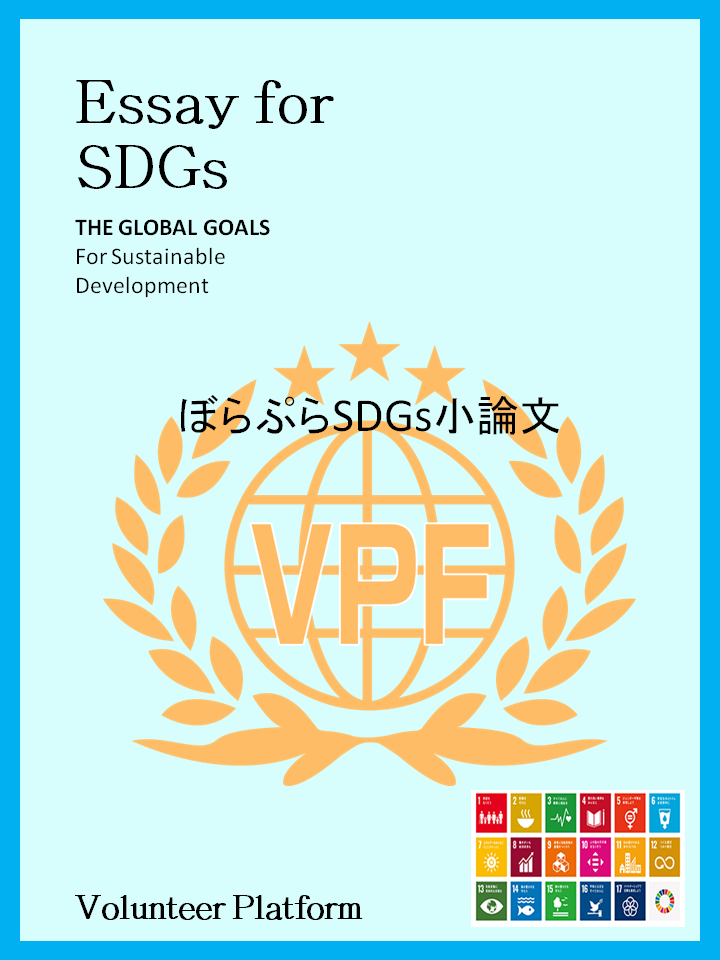[ぼらぷらSDGs小論文]

『What we can do for our future and the next generation』
小論文
『What we can do for our future and the next generation』
In today's world, Sustainable Development Goals are considered to be the foundation for a better future for everyone. These goals appeal to the global problems that are related to inequality, poverty, climate change, justice, environmental degradation, and peace. Today, I would like to write about a more specific point which is food waste which I have been studying for a while. This is actually one of the biggest problems that are also associated with SDG 12 which encourages more sustainable consumption and production patterns through various measures. Moreover, it is also connected to SDG 13 which is to limit and adapt to climate change.
To begin with, there are two main impacts on our lives. Firstly, as a consequence of burning wasted food, it emits a lot of greenhouse gases including carbon dioxide which is the biggest cause of global warming. What is more, wasted food has taken loads of fresh water, land, and labor to produce. For instance, people cut the trees and destroy the forest in order to create a huge area. As a result, many organisms can not live in the forest and they might die due to this.
Moving to the next, how much do we actually have wasted food? According to the United Nations, people waste almost a billion tonnes of food a year; what is more, it is the most comprehensive assessment of data and found waste was about double the previous best estimate. The food discarded in homes alone was 74 kg per person each year on average around the world, the United Nations found. So, what can we consider the factors contributing to food waste? Conceivable, grocery stores contribute to food waste by encouraging consumers to buy more than they need, overstocking shelves, inaccurately predicting shelves or damaging products. Restaurants also waste food by mid-managing inventory, poor many choices, or oversized portions. In this way, a lot of homes and stores are thrown away due to many reasons.
Lastly, In my view, despite the fact that solutions might differ between countries; nonetheless, in general, a lot of nations spend too much time, money, and important natural resources to process wasted food. In fact, food waste costs the global economy approximately USD 940 billion annually. What is more, in Japan, we use roughly USD 195 billion each year. So what are practical solutions to success to reduce the amount of wasted food? I would like what we can do in Japan. Firstly, it can be divided into two types of food waste: those that are expired and inedible, or those that are expired best before date or are damaged fruit and vegetables. So, people should make use of foods that they are still able to eat but can not sell. For instance, people should systematize such food for the poor, selling it very cheaply or providing it for free. In Europe, there are already markets where food that cannot be sold but can be eaten is sold at low prices. From my experience, when I went to Paris, I saw small spaces that operated for poor people and provided food. Indeed, there are children's cafeterias in Japan, but it is a good idea to distribute them to all age generations. It would be a good use of products that are edible but damaged or expired and can no longer be sold. In addition to this, if we change the materials or types of food wrapping might be predicted to reduce the amount of food waste. For example, normal plastic expires very quickly if the food itself is exposed to air, whereas vacuum bags can be expected to extend shelf life, although they are more expensive than using regular plastic. These ideas may require money. But I think people should spend their money on things like these ideas that can prevent that even a little bit, instead of losing a lot of food and putting their efforts into dealing with it.
In conclusion, certainly, population size has been increasing; thus, it was to be expected the amount of food waste to rising. However, if we continue to throw away the same or even more food waste, it not only harms the environment including climate change due to burning the food waste but also this wasted food has taken loans of fresh water, land, and labor to produce. Thus, we need to take more seriously about these problems and we should act on practical solutions such as considering more deeply before they buy and changing the materials of food wrappers, even if those actions are small things for our future and the next generations.
オンライン研修を受講した感想
総合的な満足度
満足

受講前の気持ち
SDGsについて学びたい、将来の進路に活かしたい
受講後の気持ち
いい経験になった!
研修を受講した理由を教えて下さい
海外の高校にいる私にとって、このような自分が興味ある分野についてより深く調べることで、日本の大学の受験の時に良いと考えたからです。
研修を受講した感想は?
自分が既に知っている知識、そして、今回知ったこと、それを組み合わせてより深い学びになったことを感じ有意義な時間だったと思いました。
今後、今回の経験をどのように活かしていきたいですか?
これからどのような形で、社会の持続可能な目標に貢献できるのか、真剣に考えて実行していきたいと思います、
これから受講される方へアドバイスお願いします!
ぜひ、





 LINE相談
LINE相談
